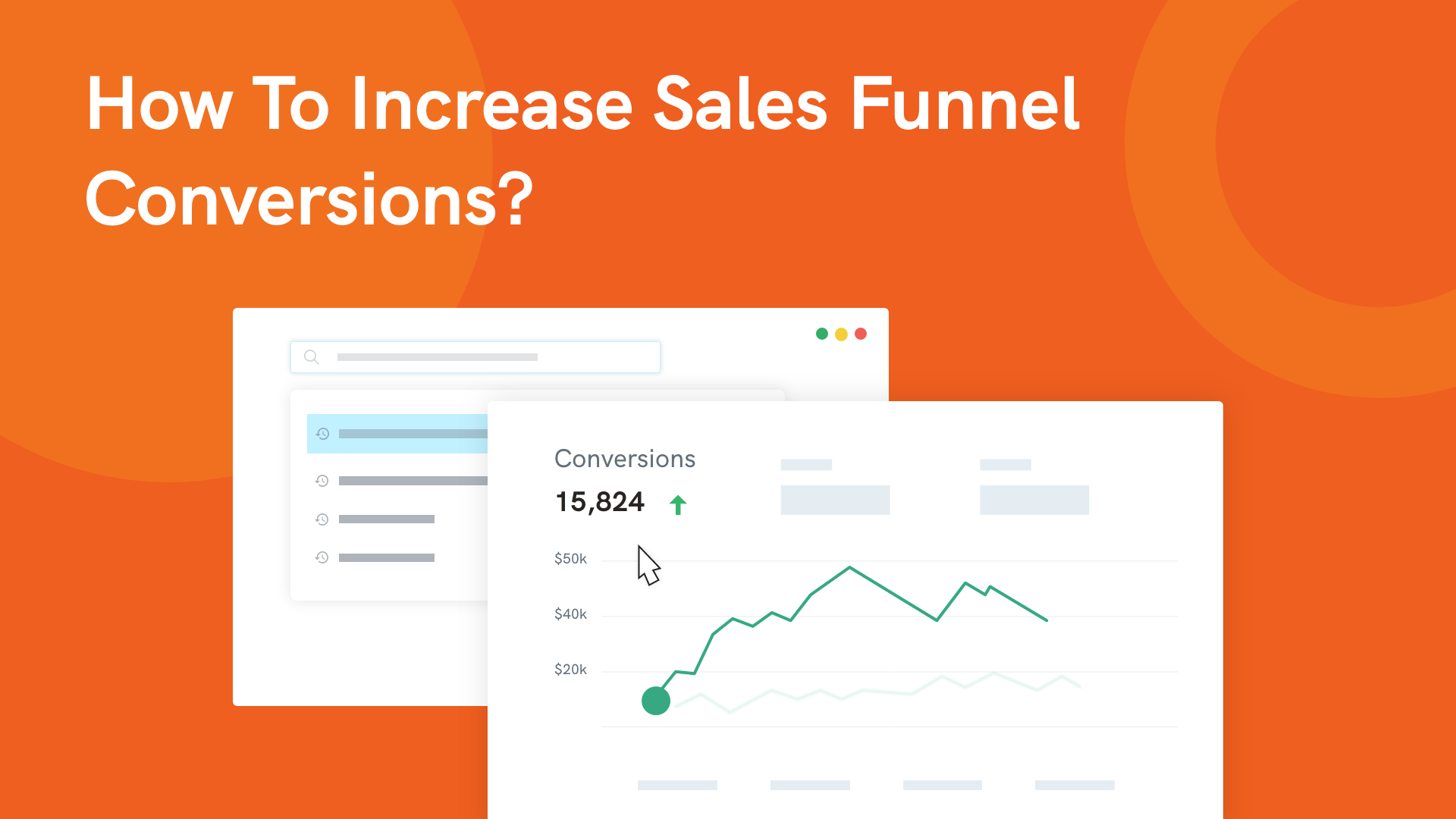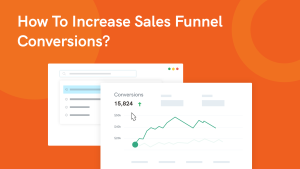How do you increase sales funnel conversions? This may seem like an impossible task when the number of conversions you’re currently getting is so low. Yet, there are many things you can do to reach your goals and increase sales funnel conversions. Here are ten tips that will help you achieve success with your sales funnel conversion rates today.
Introduction
Sales funnel conversions are vital to the success of any business, but so many companies have trouble getting them as high as they’d like. If you’re one of these companies and would like to improve or increase sales funnel conversions, take a look at this list of 10 tips for increasing sales-to-funnel conversions.
- Start with a problem.
- Offer something compelling.
- Create a solid offer.
- Make it easy to buy.
- Use Social Proof
- Find the right buyers.
- Show them what they want.
- Get them to take action.
- Deliver what you promised.
- Think like a customer.
- Ask for referrals.
These tricks will help you boost your sales funnel conversions and get more revenue in no time!
Build trust & FOMO
Highlight real-time activities like reviews, sales & sign-ups.
1. Start with a problem
You’re attempting to close an online sale, and you need your sales to funnel to convert more customers. The good news is that there are many things you can do to increase sales funnel conversions.
There are great tips that can help get your conversion rate up and keep it up—which will lead to more sales!
Here they are:
- How many times have you been on a website and clicked away because it didn’t load quickly?
People hate having to wait, which is why speed plays such an important role in increasing your sales funnel conversions.
People will leave your site if it takes too long to load and you will lose your user.
Instead, make sure your site loads so that visitors aren’t tempted to leave before making a purchase.
- When someone clicks on one of your ads or social media posts, where does he or she go next?
If he or she lands on a page with no information about what you’re selling or how much it costs, then you may lose out on potential sales.
Make sure that every landing page has all of the information people need before making a purchase decision (including price).
It should also be easy for them to find what they want don’t make them search around! Your homepage should clearly explain what problem you solve and how it benefits potential customers.
Related Post: How to Increase Conversion Rate in Sales
2. Offer something compelling
If you’re selling something, offering something free will almost always increase sales funnel conversions.
- What can you offer to potential customers that are valuable but don’t cost you much?
- Offering a download, a guide, or an ebook, essentially anything digital, can help to increase sales funnel conversions by getting more people interested in what you have to sell.
- Offering refunds also helps foster trust between you and potential customers who are thinking about purchasing your business.
If someone feels like they have time to try out whatever it is that you’re selling, they’ll be more likely to make a purchase down the line.
3. Create a solid offer
Your offer is everything. That’s all people see it first, even if you have a fancy headline. If it’s weak or generic (increase sales funnel conversions today!), people will click away sometimes to your competitors. You don’t want that.
You need to create a specific and attractive offer that speaks directly to your target audience and encourages them to take action.
When you create an offer with built-in trust, credibility, and urgency, two things happen –
1) People feel more comfortable giving you their contact information because they know what they’re getting into.
2) They buy from you because they recognize how much value your offer provides.
4. Make it easy to buy
Make sure your site is easy to navigate. Having an easy checkout process and shopping cart increases sales funnel conversions if you’re selling a product.
Make it possible to pay with PayPal or major credit cards, so people don’t have to enter their financial information more than once.
And if you can, let customers buy from mobile devices; that’ll also improve conversion rates. (People are making more purchases on mobile phones than ever before.)
Make sure your products arrive quickly, too. People expect fast shipping these days even faster than they expect good customer service. So factor in transit time when planning inventory levels.
Even though many online shoppers place orders after business hours, most companies still rely on their local postal services to deliver packages overnight; they simply promise delivery by 10:30 am the next day.
When in doubt about how long something will take to ship out of your warehouse, add two days onto whatever you think will be fastest customers will appreciate knowing when their package should arrive. They might even forgive slow shipping times if they know what’s going on behind the scenes at your company!
5. Use Social Proof
Social proof is a powerful tool to increase sales conversions. It can be used to improve your website’s conversion rate and increase the number of conversions.
Social proof is a concept that people use to make decisions about what they should do or believe. They often rely on the opinions of others to make decisions or form opinions.
The first step in using social proof effectively is understanding its impact on decision-making. The second step is identifying when you should use it and when you shouldn’t.
Tools like WiserNotify can help you build trust and increase conversion rates with social proof automation. You can display sales pop-ups, conversion notifications, reviews, announcements, and more. It also offers widgets to create urgency and integrates directly with 200+ tools. It also allows you to intelligently target audiences based on their behavior.
Related:
50+ real examples of social proof
How to Use Social Proof Notifications on ClickFunnels?
6. Find the right buyers
- Who is buying your product or service?
- Who do you want to be buying it?
To build a sales funnel that converts, you must first have a laser-targeted buyer.
Build a buyer persona: The better you know your buyers, their needs, and their problems, the more effectively you can create content and offers to get them to buy.
One of our favorite ways to dig into buyers is using Facebook ads.
Here’s how:
Write down some sample target buyer questions (for example, What’s my competition doing that I’m not?). Go on Facebook and set up an ad targeting everyone who has been tagged in any post with those terms.
Build trust & FOMO
Highlight real-time activities like reviews, sales & sign-ups.
7. Show them what they want
An effective sales funnel is all about meeting your customers’ needs. But what if you have no idea what those requirements are?
One of the best ways to discover them is by using something called an empathy map.
To make one, first, write down a list of pain points that your target market may be experiencing, then create a tree-like diagram showing how these problems relate to each other and where they stem from.
In doing so, you’ll better understand your potential customer’s worldview and see things from their perspective, which will help you figure out exactly what it is they want.
This will also help with crafting messaging that resonates with people on an emotional level.
For example, instead of telling someone their business could use more leads, explain why more leads would solve their problem or improve their life in some way.
8. Get them to take action
First, you need to increase sales funnel conversions. To do that, you have to get your visitors to take action; they need to interact with your content or product in some way.
A few ways to do that include:
- You have to use forms on landing pages.
- Including clear calls-to-action (CTAs) in emails and blog posts, you are offering valuable free content like ebooks or white papers on your website.
- Make sure that it’s easy for them to find out about upcoming events like webinars or live workshops.
So remember it’s important not just what you tell them but how you tell them!
9. Deliver what you promised
Referrals are an excellent way to quickly expand your client base if you’re willing to put in some time and effort.
The easiest way to increase referrals is by proactively asking customers if they’d be willing to refer you to others. Even though it can feel awkward, sending a simple email like one requesting input on potential services or products is a great place to start.
You can also take things up a notch by asking friends and family if they know of anyone looking for your type of work.
Don’t forget: An old sales adage holds that everyone knows at least six people who could use your product or service; don’t let that fact go untapped!
10. Think like a customer
Once you have a customer or two, ask them if they know of anyone else who might be interested in your product.
Even if someone isn’t immediately interested, sharing your product will make them feel good about doing business with you, and that feeling can fuel future sales.
In addition to referrals, reaching out to customers through email newsletters, Twitter or Facebook allows you to build brand awareness.
As more people become aware of your brand and how great it is, more people will want to do business with you. Think like a customer and give them what they want!
11. Ask for referrals
There’s an adage that states, referrals are best. You might be thinking, But wait a minute: don’t I have to know people who would benefit from my product or service? The answer is yes; however, your referral sources don’t necessarily have to be your closest friends and family members.
The most effective way to make sure you get more referrals is to ask those you already have a relationship with (e.g., customers).
When was the last time you went out of your way to give someone a referral?
This approach will increase sales funnel conversions instead of expecting people to come knocking on your door and offering their business because they love you so much.
Conclusion
It doesn’t matter how great your business idea is if you can’t get anyone to buy it. While you won’t be able to make your funnel perfect, there are things you can do to maximize conversions throughout each step of your sales process. The strategies in this post will help guide you in optimizing conversion rates and getting more out of every sale. However, keep in mind that no one strategy will work 100% of the time. Try a few different ones until you find what works best for your company. These tips will help increase sales funnel conversions and boost your bottom line when used together.







